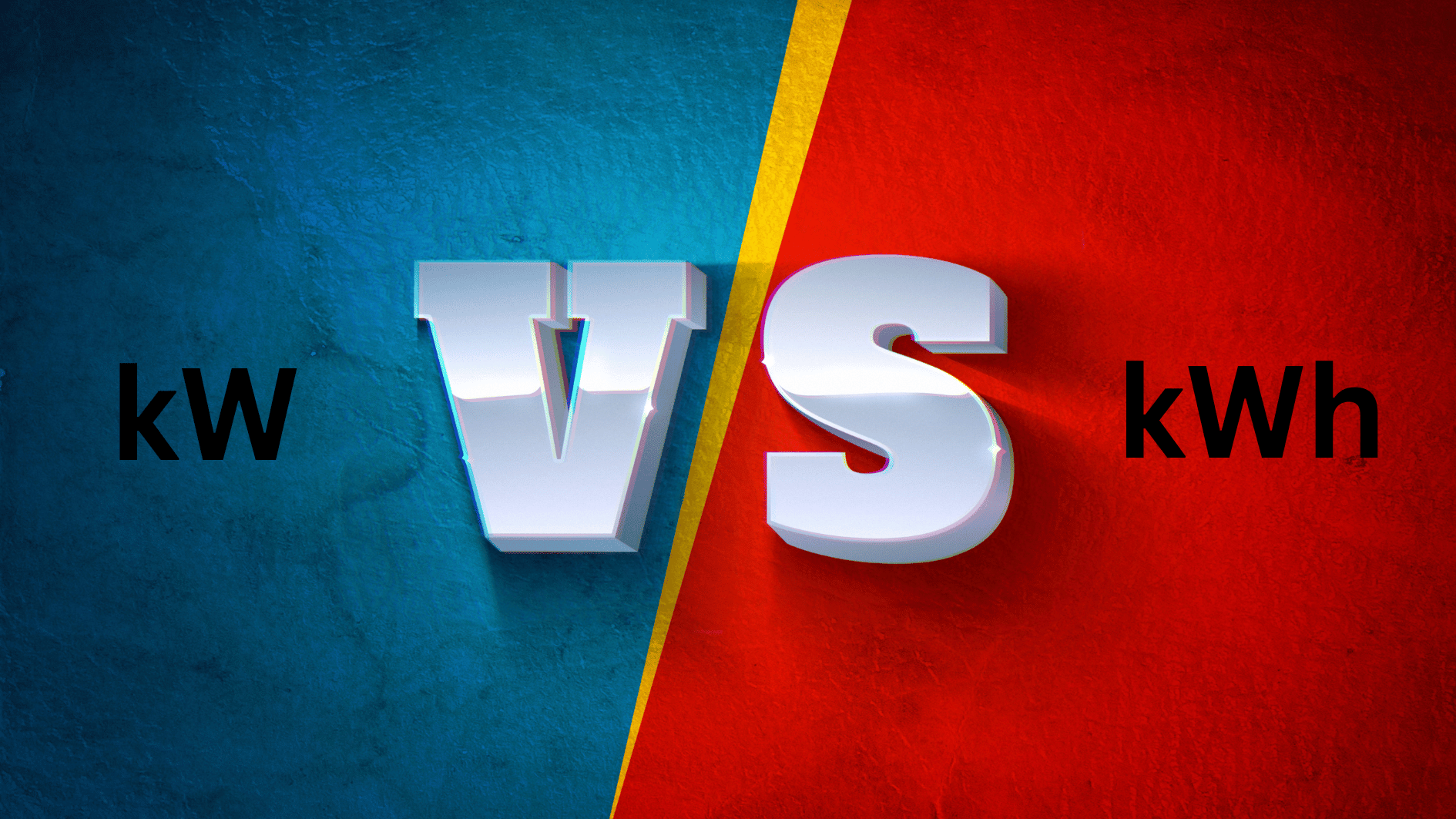Image source: Canva.com
When discussing electricity, especially in relation to solar energy systems, you may come across terms like kilowatts (kW) and kilowatt-hours (kWh). While they sound similar, they refer to very different aspects of energy production and consumption. Understanding the difference between these two terms is crucial if you’re considering solar power for your home or business. In this article, we’ll break down the difference between kilowatts and kilowatt-hours, explain how they relate to your energy use, and show why they are important when evaluating solar energy systems.
What is a Kilowatt (kW)?
A kilowatt (kW) is a unit of power. It measures the rate at which energy is being used or generated at a specific moment in time. One kilowatt is equal to 1,000 watts (W). In simpler terms, it tells you how much power an appliance or device is consuming or how much electricity a solar panel system can generate at a given instant.
For example:
- A standard light bulb may use about 60 watts (W) of power when turned on.
- An air conditioning unit might use around 3 kilowatts (kW) of power when running.
When it comes to solar energy systems, kilowatts are often used to describe the system’s capacity – how much energy it can generate under optimal conditions. For instance, a 5 kW solar system can generate up to 5 kilowatts of electricity when operating at full capacity in direct sunlight.
What is a Kilowatt-Hour (kWh)?
A kilowatt-hour (kWh) is a unit of energy. It measures the total amount of electricity used or generated over a period of time. One kilowatt-hour is equal to the amount of energy consumed or produced by using 1 kilowatt of power for 1 hour.
For example:
- Running a 100-watt light bulb for 10 hours will consume 1 kWh of energy (100 watts x 10 hours = 1,000 watt-hours or 1 kWh).
- Operating a 3 kW air conditioner for 2 hours will use 6 kWh of energy (3 kW x 2 hours = 6 kWh).
In the context of your electricity bill, the kWh represents the total energy you’ve used over the billing period. The more kWh you consume, the higher your energy costs will be.
The Key Difference: Power vs. Energy
The main distinction between kW and kWh is that kW measures power, while kWh measures energy.
kW
Kilowatts tell you the rate of electricity usage or production at a moment in time.
kWh
Kilowatt-hours indicate the total amount of electricity used or produced over time.
To put it simply, kW is like the speed of your car (how fast you’re going at a specific moment), while kWh is like the distance you’ve traveled over time.
How kW and kWh Relate to Solar Power Systems
Understanding the difference between kW and kWh is particularly important when considering solar energy systems for your home or business.
Solar Panel System Size: Kilowatts (kW)
The size of a solar panel system is often described in terms of its capacity, which is measured in kilowatts (kW). This represents how much power the system can produce at its peak performance.
For example, a 6 kW solar system can generate up to 6 kilowatts of power in full sunlight. However, the actual amount of electricity produced will vary depending on factors like weather conditions, shading, and panel orientation.
Energy Production: Kilowatt-Hours (kWh)
The total energy your solar panels generate over time is measured in kilowatt-hours (kWh). This is a key metric for determining how much electricity your solar system produces in a day, month, or year.
For example, if your 6 kW solar system produces 6 kW of power for 5 hours of sunlight each day, it would generate 30 kWh of energy per day (6 kW x 5 hours = 30 kWh). Over the course of a month, this could add up to about 900 kWh of energy.
Energy Consumption and Offset
When evaluating solar systems, you’ll also want to consider how many kWh of energy you typically consume each month. This can be found on your electricity bill. The goal is to install a solar system that can generate enough kWh to match or exceed your monthly electricity usage, allowing you to offset your energy costs and potentially achieve net-zero energy consumption.
For instance, if your home uses 900 kWh of electricity per month, you would need a solar system that can generate at least 900 kWh of energy over that period to fully offset your electricity bill.
Why It’s Important to Understand kW and kWh
Whether you’re calculating your household energy consumption, planning a solar installation, or simply trying to lower your electricity bills, understanding the difference between kW and kWh is essential. Here’s why:
Sizing Your Solar System
Knowing how much power (kW) your home needs at any given time helps determine the right size of the solar system to install. This ensures you can meet your energy demands without over- or under-sizing your system.
Your electricity provider charges you based on how many kWh you consume. Understanding this helps you track your energy usage and identify ways to reduce it, whether through energy-efficient appliances or investing in solar.
Energy Bills
Solar Energy Production
Understanding kWh allows you to estimate how much energy your solar panels will produce over time, helping you evaluate the financial benefits of switching to solar and how much of your electricity costs you can offset.
In summary, kW refers to the power output or consumption at a specific moment in time, while kWh refers to the total energy used or generated over time. Both units are important for understanding your energy usage, calculating solar system size, and assessing your potential savings with solar power.
By grasping the difference between these terms, you can make more informed decisions about your energy needs, whether you’re looking to reduce your electricity bills, install a solar system, or simply monitor your home’s power consumption more effectively.






